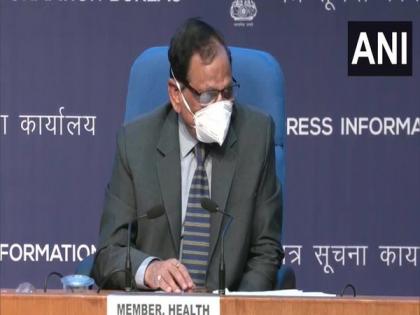Amid Omicron concerns, Centre says genome sequencing of every sample not possible
By ANI | Published: December 17, 2021 06:28 PM2021-12-17T18:28:35+5:302021-12-17T18:35:07+5:30
Genome sequencing of every sample is not possible, Union Health Ministry said on Friday amid concerns over the Omicron variant of COVID-19.

Amid Omicron concerns, Centre says genome sequencing of every sample not possible
Genome sequencing of every sample is not possible, Union Health Ministry said on Friday amid concerns over the Omicron variant of COVID-19.
Addressing a press conference on Friday, NITI Aayog Member of Health Dr VK Paul said, "Genome sequencing of every sample is not possible. It is a surveillance and pandemic assessment and tracking tool, not a diagnostic tool as of now. We can assure sufficient systematic sampling is being undertaken."
Further, Director-General of the Indian Council of Medical Research Dr Balram Bhargava today said, "We have been discussing these anti-viral COVID-19 pills. We have found that these pills need to be given very early, even before the diagnosis of the disease. Scientific data is still not supported in a big way that the pills will be useful at the moment."
As many as 101 cases of Omicron variant of COVID-19 so far have been detected across 11 States and Union Territories, the government informed on Friday.
Addressing a press conference, Joint Secretary of Health Ministry, Lav Agarwal said that 32 cases were reported in Maharashtra, 22 in Delhi, 17 in Rajasthan, 8 each in Karnataka and Telangana, 5 each in Gujarat and Kerala, one each in Andhra Pradesh, Chandigarh, Tamil Nadu and West Bengal respectively.
He said that the Omicron variant has been found in 91 countries in the world.
"World Health Organisation (WHO) has said that Omicron is spreading faster than the Delta variant in South Africa where Delta circulation was low. It's likely Omicron will outpace Delta variant where community transmission occurs, WHO added," Agarwal said.
A new variant of COVID-19 was first reported to the World Health Organisation (WHO) from South Africa on November 25. As per the WHO, the first known confirmed B.1.1.529 infection was from a specimen collected on November 9 this year.
On November 26, the WHO named the new COVID-19 variant B.1.1.529, which has been detected in South Africa, as 'Omicron'. The WHO has classified Omicron as a 'variant of concern'.
( With inputs from ANI )
Disclaimer: This post has been auto-published from an agency feed without any modifications to the text and has not been reviewed by an editor
Open in app